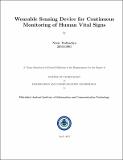Wearable Sensing Device for Continuous Monitoring of Human Vital Signs
Abstract
"Due to the emergence of autonomous sensor networks and low cost devices, continuous health monitoring is gaining interest. Blood Pressure (BP) is one of the important parameters as an indicator for cardiovascular diseases. The main focus of the thesis is to design a wearable device for continuous monitoring of human vital signs. A device measures the BP using physiological parameters like Pulse Transit Time (PTT) and Pulse Wave Velocity (PWV) obtained from Electrocardiogram (ECG) and hotoplethysmogram (PPG) sensors.
In this work, we present a single board wireless system which interfaces ECG and PPG signals with an on-board controller. Further, these captured signals are transmitted through bluetooth to a nearby aggregation device (smart phone) where these signals are processed. The aggregated device calculate the physiological parameters, like Pulse Transit Time, Pulse Wave Velocity and heart rate (HR). Various algorithms are implemented on the proposed platform to calculate BP and HR. A comparison of the algorithms is discussed on the set of standard database and an improved algorithm is developed further. Further to this, low power techniques at system level is discussed. For the low power operation, The system works in two modes: active and sleep mode. During the sleep mode operation, Watch Dog Timer of the microcontroller is con gured for a nite duration. We also discussed the data compression technique using wavelet transform on the data. The algorithm calculates the BP up to 155 mmHg for the value of diastolic time t2, where low energy performance of the system is observed. The error for SBP measurement is between -21 mmHg to 26 mmHg and the error for DBP measurement is between -13 mmHg to 17 mmHg."
Collections
- M Tech Dissertations [923]

